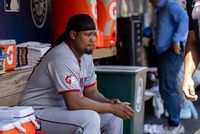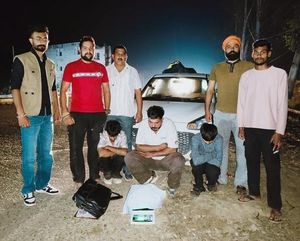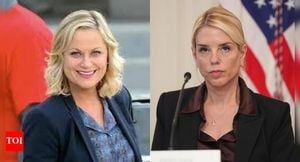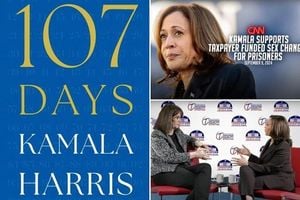Sports betting scandals have rocked the professional sports world in recent years, but the latest developments involving NBA and MLB stars have taken the controversy to new heights. On August 13, 2025, Brooklyn Nets forward Michael Porter Jr. issued a stark warning to his fellow NBA players about the dark side of sports gambling and the growing problem of stat manipulation. Speaking candidly on the "One Night with Steiny" podcast, Porter Jr. didn’t mince words as he reflected on the recent banishment of his brother, Jontay Porter, from the NBA for manipulating his own stats to influence prop bets.
“Obviously, my brother went through his situation,” Porter Jr. said, referencing the high-profile case that has sent shockwaves through the league. “Malik Beasley’s going through a situation right now. Terry Rozier was in some hot water. But the whole sports gambling entity, it’s bad and it’s only gonna get worse.” His comments echoed the anxieties of many league officials and fans who have watched the explosion of legalized sports betting transform the landscape of professional basketball—and not always for the better.
The Jontay Porter scandal stands out as one of the most egregious examples of stat manipulation in recent memory. According to league investigations, Jontay repeatedly played minimal minutes before checking out of games with purported injuries or illnesses, actions that directly influenced betting outcomes for player prop bets. “Think about it, if you can get all your homies rich by telling them, ‘Yo, bet $10,000 on my Under this one game. I’mma act like I got an injury and I’mma sit out. I’'mma come out after three minutes. And they all get a lil bag because you did it one game,’” Michael Porter Jr. explained on the podcast. “Some people come from nothing, and they think like that.”
The impact of such actions is far-reaching. Sportsbooks and their high-powered betting integrity teams quickly flagged the suspicious bets placed on Porter’s Unders, leading to a broader investigation and, ultimately, his lifetime ban from the NBA. But the problem is hardly isolated to basketball. In July 2025, the Cleveland Guardians’ star closer Emmanuel Clase was placed on administrative leave after an investigation revealed possible manipulation of his own stats, with teammate Luis Ortiz also implicated and placed on the restricted list.
The MLB gambling scandal involving Clase and Ortiz has since escalated, drawing in not just Major League Baseball but also state authorities. Cleveland.com’s Paul Hoynes broke the news that the Ohio Casino Control Commission has launched its own independent investigation, working in tandem with MLB officials. “I contacted the FBI in Cleveland and New York. They had a no comment,” Hoynes reported on the Cleveland Baseball Talk Podcast. “But then I sent an email to the Ohio Casino Control Commission and they got back to me and said, ‘Yes, we’ve started our own investigation, independent of MLB, but also working collaboratively with Major League Baseball into Clase and Ortiz and the gambling allegations against them.’”
The Ohio Casino Control Commission, a bipartisan regulatory body with oversight of the state’s gaming industry, has reportedly detected irregular betting patterns tied to Ohio, New Jersey, and New York—states with major sports betting markets. Investigators are focusing on bets linked directly to performances by Clase and Ortiz, raising the stakes for both the players and the league. The involvement of state regulators means that the consequences could extend far beyond league suspensions or bans; criminal charges may be on the table if the allegations are substantiated.
Ohio Governor Mike DeWine has seized on the scandal to renew his campaign against prop betting in professional sports. Having already pushed through a ban on prop bets in college athletics—citing threats against student-athletes from disgruntled bettors—DeWine is now championing similar restrictions for pro sports. “He’s already rid college sports of prop betting due to threats against athletes from bettors, and he may use this high-profile case to help his argument for professional sports,” Hoynes noted. As of August 2025, prop betting has been banned in college sports across 16 states, reflecting national concern about the vulnerability of athletes and the integrity of competition in the face of mounting gambling pressures.
Prop betting, especially micro-betting on specific plays—like individual pitches in baseball or make/miss basket props in basketball—has become a flashpoint for controversy. Ohio regulators have proposed banning these types of bets in the NBA and MLB, hoping to stem the tide of manipulation and scandal. Yet, as experts warn, outright bans could push gambling activity underground, making it even harder for authorities to detect and prosecute illicit behavior. “Although like anything, banning some things could eventually make that action go to the black market, which would make it nearly untraceable,” cautioned New York Post Betting’s Erich Richter, an industry analyst with a proven track record in the player prop market.
What’s driving athletes to such risky behavior? According to Michael Porter Jr., the answer is as much about economics and background as it is about temptation. “Some people come from nothing, and they think like that,” he said, reflecting on the pressures faced by young players who see a chance to quickly enrich themselves and their friends. The lure of easy money, combined with the anonymity and speed of modern betting platforms, creates an environment ripe for abuse.
Meanwhile, the investigation into Clase and Ortiz continues, with both players’ futures hanging in the balance. MLB and the Ohio Casino Control Commission have yet to announce their findings, and the FBI’s silence only adds to the intrigue. For now, both pitchers remain sidelined—Clase on administrative leave since July 28, 2025, and Ortiz on the restricted list since July 3, 2025—as the leagues and law enforcement dig deeper into the suspicious betting activity.
As the scandals unfold, they serve as a cautionary tale for athletes, league officials, and regulators alike. The intersection of sports and gambling, once a taboo subject, is now front and center in the national conversation. With prop betting under increasing scrutiny and the threat of criminal charges looming over those who cross the line, the stakes have never been higher for professional sports in America.
For now, all eyes remain on the ongoing investigations. Will the latest wave of scandals prompt meaningful reforms, or will the black market simply adapt and grow? One thing’s for sure: the integrity of the game—and the trust of fans—hangs in the balance.




